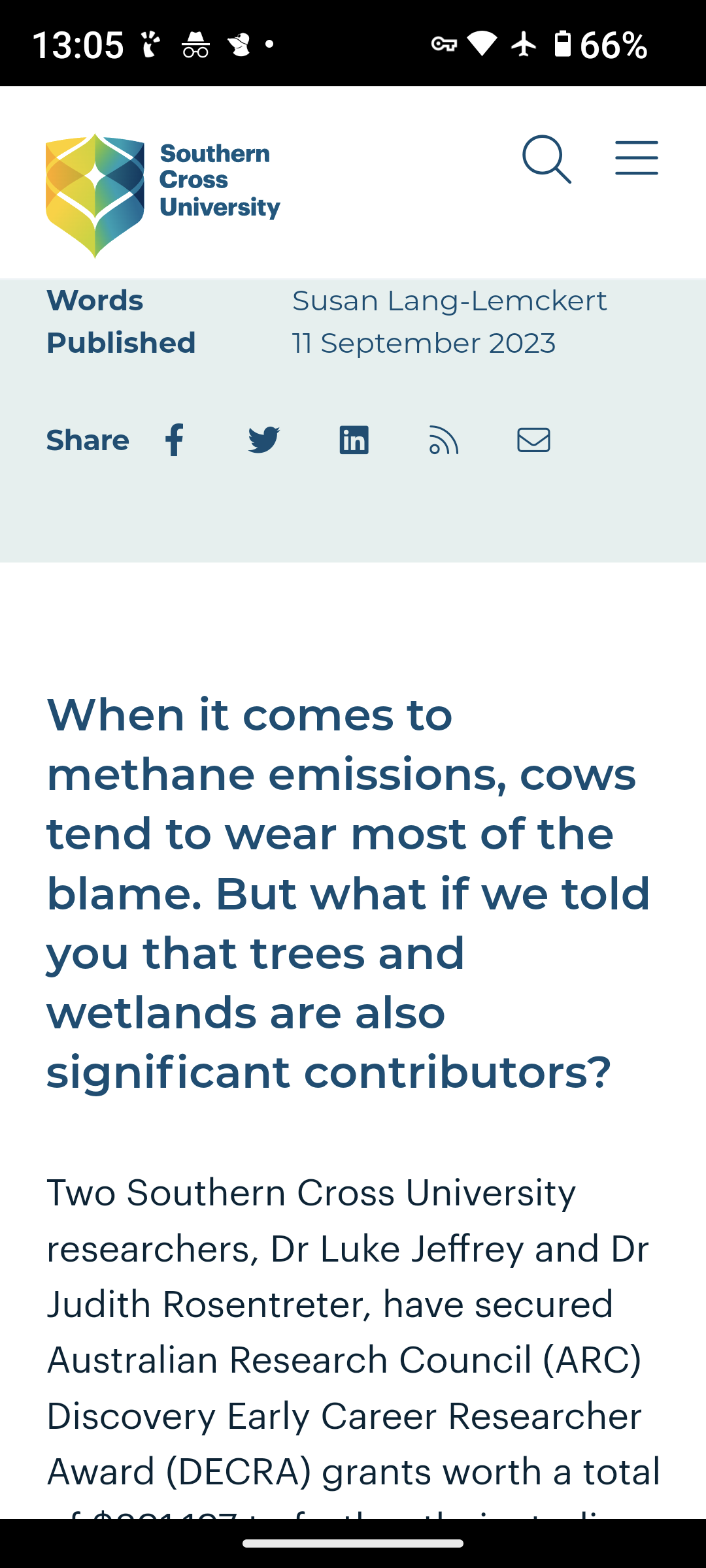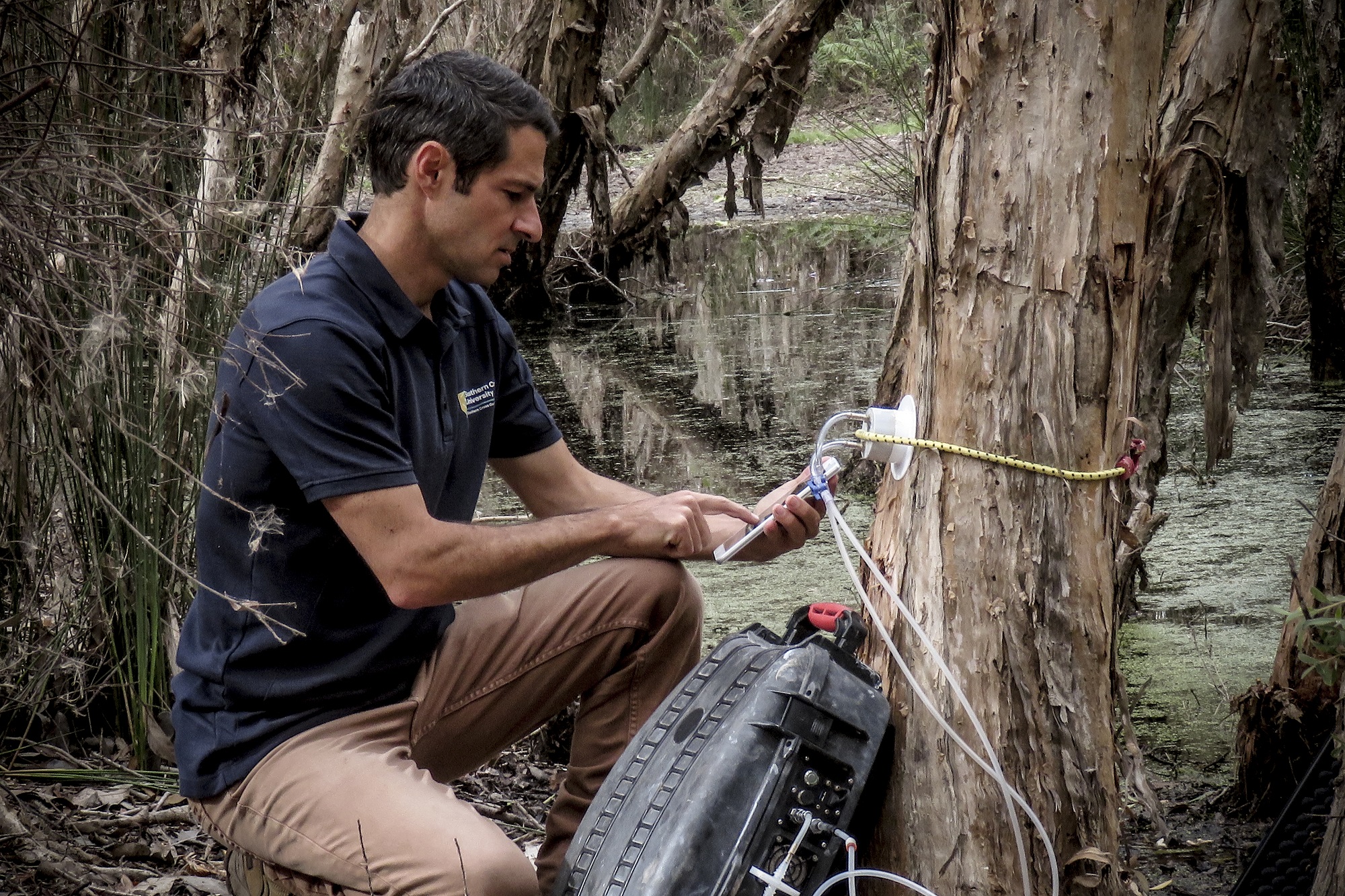Two Southern Cross University researchers, Dr Luke Jeffrey and Dr Judith Rosentreter, have secured Australian Research Council Discovery Early Career Researcher Award grants worth a total of $891,197 to further their studies on methane emissions from vegetation, soils and water, which have already turned up some game-changing findings.
So we now know that bark dwelling microbes have the capacity to regulate the methane emissions from trees and therefore may play an important mitigation role in the global methane cycle and in climate change.
Dr Jeffrey’s previous research, which earned him a Chancellor’s Medal from Southern Cross University and has been recognised in the United Nations Intergovernmental Panel on Climate Change Assessment Report 6, has shown that wetland trees can emit substantial amounts of methane, or ‘treethane’, via their stems or trunks - a process that, until now, has been broadly overlooked.
“While wetland soils store vast amounts of carbon, they also emit methane, a greenhouse gas that is about 45 times more powerful than carbon dioxide when it comes to warming our planet,” said Dr Jeffrey.
In a different but related area of study, Dr Judith Rosentreter’s new research, funded with an ARC DECRA grant worth $434,042, will focus on identifying and quantifying methane oxidation and production processes in mangrove environments, mostly in soils and water.
Who’s doing the study on the billionaires?
… but this has been happening for millions of years. The problem is the introduction of previously sequestered carbon that adds to the ongoing carbon cycle.
How do you know it’s been happening for millions of years? Science, like this, has told you it is.
I had to swap the title out for the opening statement so it seems more clickbait-y that it was intended to be. The actual title created by lemmy is:
DECRA grants to Jeffrey and Rosentreter
So what is the point here? Like it is interesting, but rainforests and wetlands are important parts of the ecosystem. Coal power plants, for example, are not.
lmao even lemmy.world is dunking on you.
It’s so they can measure storage and release of parts of the ecosystem for accounting purposes, which may account for projects, like coal mines, going ahead or not, I suppose.
We can’t be anti-science if people want to hyper-focus on certain aspects of the natural world.
When it comes to methane emissions, cows tend to wear most of the blame. But what if we told you that trees and wetlands are also significant contributors?
So what if?
So we now know that bark dwelling microbes have the capacity to regulate the methane emissions from trees and therefore may play an important mitigation role in the global methane cycle and in climate change.
It’s literally in the summary.
Yes I just take issue with your editorializing of the title. Cuz it sounds to me like it’s made out to downplay the actual issue of animal agriculture being destructive.
Sure. If you use the title to form an opinion, I can see how it be taken that way.
But we all know not to do that, right? That’s why we read the articles, and to a lesser extent, the summary? Not only does the summary mention why it’s important, the article has a good quote too:
"However, our research has also uncovered hungry and abundant ‘methane-eating’ communities of bacteria living within the bark of the common Australian paperbark tree, which consume the methane and convert it to carbon dioxide – a far less potent greenhouse gas. This paradigm shifting discovery changed how we view the role of wetland forests within the global methane cycle.”
But for you, I will change it. I guess when you’re mostly the only one submitting content to this community, you also get it wrong too, by opening links, using multiple summarisers, and changing the title to something out of the original article when it doesn’t suit.
Sure. If you use the title to form an opinion, I can see how it be taken that way.
You’re the one that made the title that way. I am asking why you chose that wording. I did read the article and your title makes zero sense in context.
The implication from your title is that “cattle farming isn’t so bad because look at this study that doesn’t reinforce that insinuation!”
Yes, mate, you’re never wrong. Just leave it, huh?

Cows are any easy fix. You just change their feed and they emit less methane. Might as well do it since it’s “low hanging fruit”.
One of the world’s longest commercial trials of a seaweed supplement that the global meat industry hopes could slash methane from beef cattle has recorded much lower reductions in the potent greenhouse gas than previous studies.
Putting the supplement into the diets of 40 wagyu cattle in an Australian feedlot for 300 days cut the methane they produced by 28%. The supplement was derived from the red seaweed species Asparagopsis, which has been widely promoted as being able to cut methane by more than 80%, with some experiments suggesting reductions as high as 96%. Globally, the UN’s Food and Agriculture Organization estimates, methane from burping cattle - known as enteric emissions - releases about 2.1bn tonnes of CO2-equivalent a year, compared with the 37.5bn tonnes of CO2 from burning fossil fuels.
Because methane is about 80 times more potent than CO2 at warming the planet over a 20-year period, cutting methane is seen as a way to slow global heating faster.
The trial report noted that other experiments over shorter timeframes using the same open-air measurement technique had recorded higher methane reductions.
The latest trial was financially backed by the country’s biggest beef producer, the Australian Agricultural Company, which helped run the trial and provided the animals.




